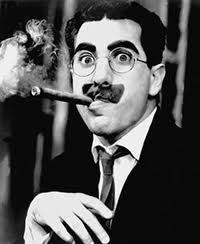Cliff Michaels's Blog, page 3
July 19, 2012
Einstein’s 5-Minute Problem Solver & My 5-Point Question Quiver
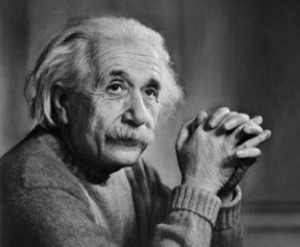 What’s Your Decision-Making Filter?
What’s Your Decision-Making Filter?Decisions are often driven by emotions. What if I fail? Will I feel good? What if I make the wrong choice?
We’re also motivated by logic. How much will it cost? Is much effort required? Is this good for business? Better questions might be: What worked? What didn’t? Who’s been down this road before?
Many decisions require deliberate thought while others call for swift action. Either way, no one makes the right choice all the time. But the worst decision is the one we never make.
The 5-Minute Solution
In the hierarchy of entrepreneurial thinkers, it’s the scientists, engineers, and mathematicians who solve some of the world’s toughest problems because they’re simply willing to work longer on solutions. But is there a trick that we mortals can use for fun and fast results to everyday challenges?
In 8th grade, I did a book report on Albert Einstein and never forgot one of his most important lessons. Einstein said, “If I had an hour to solve a problem and my life depended on it, I would use the first fifty-five minutes to formulate the right question. Once I’ve identified the right question, I can solve the problem in less than five minutes.”
From that middle-school paper, I developed my 5-point question quiver.
What does my gut tell me?
What’s the best-case / worst-case scenario?
Is this decision negotiable? What if …? Can we …? Why not …?
Can I have fun and flip a coin (heads-vanilla, tails-chocolate)?
Can I get help or delegate the decision, then live with the outcome?
So whether you’re working on a killer business plan, global warming, or peace in the middle east, think about your smartest question quiver to launch ideas, make tough decisions, and solve complex problems.
P.S. The first one on the list above is my ultimate tie-breaker. Have fun noodling solutions!
This blog is from a chapter section in…
The 4 Essentials of Entrepreneurial Thinking
Essential 2, Strategy 4 – Decisions and Problem Solving
July 18, 2012
9 Inspirational Keys vs. 9 Motivational Killers
 In today’s highly competitive job market, it’s not enough for business owners to offer attractive salaries & health benefits. Workers are driven more than ever by passion, purpose, and principles. In fact, there are at least 9 reasons beyond financial reward that makes one gig sexier than another. So whether you’re an employer hoping to attract talent, or job-seeker tallying the true value of your next workplace, consider the following…
In today’s highly competitive job market, it’s not enough for business owners to offer attractive salaries & health benefits. Workers are driven more than ever by passion, purpose, and principles. In fact, there are at least 9 reasons beyond financial reward that makes one gig sexier than another. So whether you’re an employer hoping to attract talent, or job-seeker tallying the true value of your next workplace, consider the following…
9 Inspirational Keys vs. Motivational Killers
New vs. Old stuff
Fun vs. boring
Career advancement vs. Dead-end job
Championship potential vs. Losing record
Emotionally rewarding vs. No sense of purpose
Respect and recognition vs. Disrespect and being ignored
Making a difference vs. No sense of contribution
Positive environment vs. Negative environment
Being part of a team vs. No sense of belonging
The 10th and final key is usually about money, including future upside. After all, everyone needs to pay the bills. But study after study shows that people take lower paying jobs for quality of life, even if they have the opportunity for bigger salaries. If the experience is more rewarding, they’re also less likely to quit or burn out.
In the end, life and business decisions go hand-in-hand as individuals and families seek out better schools, stronger communities, and inspiring workplaces. Volunteers even spend their weekends and evenings doing something they love, not for the money, but for passion and purpose!
As Maya Angelou says, “Success is liking yourself, liking what you do, and liking how you do it.”
This blog is from a chapter section in…
The 4 Essentials of Entrepreneurial Thinking
Essential 2, Strategy 7 – Hardcore Goal Execution
July 17, 2012
100 Famous Mentors in The 4 Essentials of Entrepreneurial Thinking
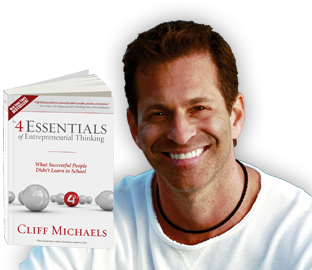 There’s an Entrepreneurial Thinker in everyone from da Vinci and Mozart to a barista in a coffee shop or a snowboard sensei. So when I sat down to write The 4 Essentials of Entrepreneurial Thinking, it was never meant to be a book about business startups per se.
There’s an Entrepreneurial Thinker in everyone from da Vinci and Mozart to a barista in a coffee shop or a snowboard sensei. So when I sat down to write The 4 Essentials of Entrepreneurial Thinking, it was never meant to be a book about business startups per se.
The original title was merely The 4 Essentials – A Path to Success & Happiness (Your Master’s in Basic Abilities)
The primary objective of The 4 Essentials was to share lessons from many mentors who had a creative mindset, passionate spirit, and profound impact on my life. The common thread was their willingness to ask “What if?” As a result, they not only had the courage to think different but to be different.
Equally important was to propose a paradigm shift in real-world education and dispel the myth of born entrepreneur, higher intelligence, or socio-ecomonic privilege as proxies for success. Research has proven time and again that when there’s a void in The 4 Essentials (life skills, action strategies, core values, or purpose principles), there’s a void for health, wealth, and happiness.
Many Missions, Many Mentors
We all have favorite teachers (poet, coach, athlete, author, business brain). But our smartest peers may be experts in one field and amateurs in another. We also carry the bias and baggage of mentors as well as their wisdom. So choose wisely. From friends and family to iconic billionaires, some are worth emulating, others are not.
Below are over 100 famous people featured in The 4 Essentials of Entrepreneurial Thinking. From life lessons, business strategies, and humanitarian ideas, I picked up something special from each that inspired my passion, purpose, and principles. I’m confident you will too.
Study one, Study them all. Mirror the Masters …
Artists, Leaders, Writers, Scientists, Teachers, Philosophers
Maya Angelou, Aristotle, The Beatles, Warren Bennis, Jeff Bezos, Sir Richard Branson, Buddha, Warren Buffett, Dale Carnegie, Charlie Chaplin, Confucius, Stephen Covey, Charles Darwin, Leonardo da Vinci, Ellen DeGeneres, Charles Dickens, Walt Disney, Peter Drucker, Amelia Earhart, Thomas Edison, Albert Einstein, Ralph Waldo Emerson, Aretha Franklin, Benjamin Franklin, Galileo Galilei, Mohandas Gandhi, Howard Gardner, Bill and Melinda Gates, Kahlil Gibran, Malcolm Gladwell, Seth Godin, Jane Goodall, Daniel Goleman, Stephen Hawking, Napoleon Hill, Helen Keller, Elisabeth Kubler-Ross, Steve Jobs, Bruce Lee, Abraham Lincoln, Martin Luther King, Jr., Nelson Mandela, A.A. Milne, Margaret Mead, Wolfgang Mozart, Pablo Picasso, Friedrich Nietzsche, Tony Robbins, Sir Ken Robinson, Charlie Rose, J.K. Rowling, J.D. Salinger, Howard Schultz, William Shakespeare, Will Smith, Socrates, Steven Spielberg, Oliver Stone, Henry David Thoreau, J.R.R. Tolkien, Mark Twain, Sun Tzu, Kurt Vonnegut, Oscar Wilde, Oprah Winfrey, Stevie Wonder, 14th Dalai Lama.
Comedians, Satirists, Cartoonists
Woody Allen, Lucille Ball, Mel Brooks, Carol Burnett, George Carlin, Stephen Colbert, Bill Cosby, Billy Crystal, Ellen DeGeneres, Tina Fey, Matt Groening, David Letterman, Steve Martin, The Marx Brothers, Bill Murray, Mike Myers, Richard Pryor, Chris Rock, Charles M. Schulz, Jerry Seinfeld, Jon Stewart, Dr. Seuss, Robin Williams, Steven Wright.
Sports Legends
Muhammad Ali, Lance Armstrong, Wayne Gretzky, Mia Hamm, Tony Hawk, Magic Johnson, Pelé, Jackie Robinson, Vin Scully, John Wooden, Tiger Woods, 1980 Men’s Olympic Hockey Team.
The 4 Essentials of Entrepreneurial Thinking
The 4 Essentials of Entrepreneurial Thinking
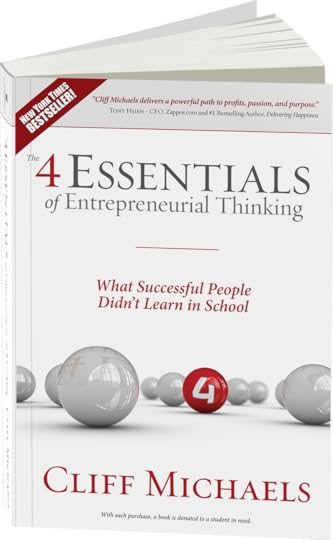
In his New York Times Bestseller, Cliff Michaels dispels the myth of born entrepreneurs and proposes a paradigm shift in global education. Taking readers on an inspiring personal journey, Michaels shares his foibles, triumphs, and tribulations as a young entrepreneur, then unleashes a dynamic system of timeless lessons
anyone can follow.
On the cutting edge of success training for over 20 years, Michaels draws on classic and modern mentors from da Vinci, Edison, Mozart, and Einstein to Jobs, Oprah, Branson, Spielberg, and more. Street-smart & thought provoking, The 4 Essentials isn’t just for entrepreneurs. It challenges all of us to earn a real-world MBA – your Master’s in Basic Abilities.
Buy Now



100 Famous Mentors in The 4 Essentials of Entrepreneurial Thinking
 There’s an Entrepreneurial Thinker in everyone from da Vinci and Mozart to a barista in a coffee shop or a snowboard sensei. So when I sat down to write The 4 Essentials of Entrepreneurial Thinking, it was never meant to be a book about business startups per se.
There’s an Entrepreneurial Thinker in everyone from da Vinci and Mozart to a barista in a coffee shop or a snowboard sensei. So when I sat down to write The 4 Essentials of Entrepreneurial Thinking, it was never meant to be a book about business startups per se.
The original title was merely The 4 Essentials – A Path to Success & Happiness (Your Master’s in Basic Abilities)
The primary objective of The 4 Essentials was to share lessons from many mentors who had a creative mindset, passionate spirit, and profound impact on my life. The common thread was their willingness to ask “What if?” As a result, they not only had the courage to think different but to be different.
Equally important was to propose a paradigm shift in real-world education and dispel the myth of born entrepreneur, higher intelligence, or socio-ecomonic privilege as proxies for success. Research has proven time and again that when there’s a void in The 4 Essentials (life skills, action strategies, core values, or purpose principles), there’s a void for health, wealth, and happiness.
Many Missions, Many Mentors
We all have favorite teachers (poet, coach, athlete, author, business brain). But our smartest peers may be experts in one field and amateurs in another. We also carry the bias and baggage of mentors as well as their wisdom. So choose wisely. From friends and family to iconic billionaires, some are worth emulating, others are not.
Below are over 100 famous people featured in The 4 Essentials of Entrepreneurial Thinking. From life lessons, business strategies, and humanitarian ideas, I picked up something special from each that inspired my passion, purpose, and principles. I’m confident you will too.
Study one, Study them all. Mirror the Masters …
Artists, Leaders, Writers, Scientists, Teachers, Philosophers
Maya Angelou, Aristotle, The Beatles, Warren Bennis, Jeff Bezos, Sir Richard Branson, Buddha, Warren Buffett, Dale Carnegie, Charlie Chaplin, Confucius, Stephen Covey, Charles Darwin, Leonardo da Vinci, Ellen DeGeneres, Charles Dickens, Walt Disney, Peter Drucker, Amelia Earhart, Thomas Edison, Albert Einstein, Ralph Waldo Emerson, Aretha Franklin, Benjamin Franklin, Galileo Galilei, Mohandas Gandhi, Howard Gardner, Bill and Melinda Gates, Kahlil Gibran, Malcolm Gladwell, Seth Godin, Jane Goodall, Daniel Goleman, Stephen Hawking, Napoleon Hill, Helen Keller, Elisabeth Kubler-Ross, Steve Jobs, Bruce Lee, Abraham Lincoln, Martin Luther King, Jr., Nelson Mandela, A.A. Milne, Margaret Mead, Wolfgang Mozart, Pablo Picasso, Friedrich Nietzsche, Tony Robbins, Sir Ken Robinson, Charlie Rose, J.K. Rowling, J.D. Salinger, Howard Schultz, William Shakespeare, Will Smith, Socrates, Steven Spielberg, Oliver Stone, Henry David Thoreau, J.R.R. Tolkien, Mark Twain, Sun Tzu, Kurt Vonnegut, Oscar Wilde, Oprah Winfrey, Stevie Wonder, 14th Dalai Lama.
Comedians, Satirists, Cartoonists
Woody Allen, Lucille Ball, Mel Brooks, Carol Burnett, George Carlin, Stephen Colbert, Bill Cosby, Billy Crystal, Ellen DeGeneres, Tina Fey, Matt Groening, David Letterman, Steve Martin, The Marx Brothers, Bill Murray, Mike Myers, Richard Pryor, Chris Rock, Charles M. Schulz, Jerry Seinfeld, Jon Stewart, Dr. Seuss, Robin Williams, Steven Wright.
Sports Legends
Muhammad Ali, Lance Armstrong, Wayne Gretzky, Mia Hamm, Tony Hawk, Magic Johnson, Pelé, Jackie Robinson, Vin Scully, John Wooden, Tiger Woods, 1980 Men’s Olympic Hockey Team.
The 4 Essentials of Entrepreneurial Thinking
July 16, 2012
Honoring Stephen Covey: A Mentor’s Legacy (1932-2012)
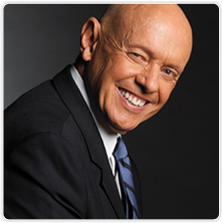 Now and then, a thought leader transcends age, gender, and time to impact millions of people. Stephen Covey (1932-2012) was such a figure and he’ll be dearly missed.
Now and then, a thought leader transcends age, gender, and time to impact millions of people. Stephen Covey (1932-2012) was such a figure and he’ll be dearly missed.
Covey’s powerful lessons were popularized through his seminal work, The 7 Habits of Highly Effective People. In a world of pop culture success gurus who shout about 3-minute secrets to health to wealth, Covey spoke slowly as he grounded us in a life practice that blended personal and professional growth.
Many of us first heard the mantras Win/Win, Empathetic Communication, and Creative Cooperation by reading Covey. Others learned about his dynamic systems through his Principle Centered Leadership and Time Management formulas.
For over 20 years, I’ve tried to build my life and companies on Covey principles like “being of service to others,” “starting with the end in mind” and “sharpening the saw”. Having influenced my life in such a profound way, I’d be remiss if I didn’t pass along his wisdom.
Below are my 3 Favorite Covey Quotes:
Live out of your imagination, not your history.
There are three constants in life … change, choice and principles.
One of the most important ways to manifest integrity is to be loyal to those who are not present. In doing so, we build the trust of those who are present.
In short, Covey gave us a blueprint for personal and professional excellence. His wisdom for principle centered leadership and accountability will forever be the standard to emulate.
The 5 Focus Rules for Success
 There are 86,400 seconds in a day. That’s 31,536,000 seconds in a year. If those were dollars and you had to use them or lose them, how would you spend your newfound wealth?
There are 86,400 seconds in a day. That’s 31,536,000 seconds in a year. If those were dollars and you had to use them or lose them, how would you spend your newfound wealth?
We spend 1/4 to 1/3 of our lives in bed. The rest of the time depends on choices (work, play, friends, family). E-mails and social media compete for our attention. The door keeps knocking and the phone keeps ringing.
How can we prioritize anything amid the never-ending siege to our senses? Moreover, chaos happens, computers fail, and people get sick. The world doesn’t stop for our high-powered to-do list. And although we manage to type with one hand and make calls with the other, a Jack-of-all-trades masters none.
There’s a famous Chinese expression, “Besides the noble art of getting things done, there is a nobler art of leaving things undone. The wisdom of life consists in the elimination of nonessentials.” Steve Jobs said something similar, “Get rid of the crappy stuff!” To that end, here are a few tips …
The 5 Focus Rules
Focus Rule # 1: Turn Off The Noise for a full day (weekends even better)
Unplug the television. Shut off the computer. Put down the cell phone. I know what some of you are thinking. “No calls? No-E-mail? No social media? That’s crazy, Cliff! What will the world do without me for a day?” I assure you, life goes on. The world will happily await your glorious return.
Focus Rule # 2: Own Your Time / Manage Expectations
Let everyone know the boundaries of your schedule. Be unavailable certain days or times. Then commit to getting things done during those focus hours.
Focus Rule # 3: Commit to Your Unique Ability
Focus on core strengths. Don’t waste time perfecting weaknesses.
Focus Rule # 4: Eliminate Non-Essentials
Reduce the number of projects and meetings on your plate. Focus on “the one thing” that has the greatest impact on everything else.
Focus Rule # 5: Space Management
Want success? Clean up the mess! Time + Space Management = Focus
For high performance people, busy calendars go with the territory. However, the more we cram into our schedule, the harder we make each task. We also create more stress. So pick your priorities with care. Bank on chaos and challenges. And remember the cardinal rule of opportunity costs:
Every second spent on one activity is at the expense of another.
This blog is from a chapter section in…
The 4 Essentials of Entrepreneurial Thinking
Essential 2, Strategy 6 – Focus and Time Management
The 4 Essentials of Entrepreneurial Thinking

In his New York Times Bestseller, Cliff Michaels dispels the myth of born entrepreneurs and proposes a paradigm shift in global education. Taking readers on an inspiring personal journey, Michaels shares his foibles, triumphs, and tribulations as a young entrepreneur, then unleashes a dynamic system of timeless lessons
anyone can follow.
On the cutting edge of success training for over 20 years, Michaels draws on classic and modern mentors from da Vinci, Edison, Mozart, and Einstein to Jobs, Oprah, Branson, Spielberg, and more. Street-smart & thought provoking, The 4 Essentials isn’t just for entrepreneurs. It challenges all of us to earn a real-world MBA – your Master’s in Basic Abilities.
Buy Now



The 5 Focus Rules for Success
 There are 86,400 seconds in a day. That’s 31,536,000 seconds in a year. If those were dollars and you had to use them or lose them, how would you spend your newfound wealth?
There are 86,400 seconds in a day. That’s 31,536,000 seconds in a year. If those were dollars and you had to use them or lose them, how would you spend your newfound wealth?
We spend 1/4 to 1/3 of our lives in bed. The rest of the time depends on choices (work, play, friends, family). E-mails and social media compete for our attention. The door keeps knocking and the phone keeps ringing.
How can we prioritize anything amid the never-ending siege to our senses? Moreover, chaos happens, computers fail, and people get sick. The world doesn’t stop for our high-powered to-do list. And although we manage to type with one hand and make calls with the other, a Jack-of-all-trades masters none.
There’s a famous Chinese expression, “Besides the noble art of getting things done, there is a nobler art of leaving things undone. The wisdom of life consists in the elimination of nonessentials.” Steve Jobs said something similar, “Get rid of the crappy stuff!” To that end, here are a few tips …
The 5 Focus Rules
Focus Rule # 1: Turn Off The Noise for a full day (weekends even better)
Unplug the television. Shut off the computer. Put down the cell phone. I know what some of you are thinking. “No calls? No-E-mail? No social media? That’s crazy, Cliff! What will the world do without me for a day?” I assure you, life goes on. The world will happily await your glorious return.
Focus Rule # 2: Own Your Time / Manage Expectations
Let everyone know the boundaries of your schedule. Be unavailable certain days or times. Then commit to getting things done during those focus hours.
Focus Rule # 3: Commit to Your Unique Ability
Focus on core strengths. Don’t waste time perfecting weaknesses.
Focus Rule # 4: Eliminate Non-Essentials
Reduce the number of projects and meetings on your plate. Focus on “the one thing” that has the greatest impact on everything else.
Focus Rule # 5: Space Management
Want success? Clean up the mess! Time + Space Management = Focus
For high performance people, busy calendars go with the territory. However, the more we cram into our schedule, the harder we make each task. We also create more stress. So pick your priorities with care. Bank on chaos and challenges. And remember the cardinal rule of opportunity costs:
Every second spent on one activity is at the expense of another.
This blog is from a chapter section in…
The 4 Essentials of Entrepreneurial Thinking
Essential 2, Strategy 6 – Focus and Time Management
July 13, 2012
Show Me The Funny! 20 Famous One-Liners
Dear Friends: It’s a medical fact that laughter is the ultimate cure for the common cold or a crappy day. Why else would we have a funny-bone? So for everyone who wants to be happier, sexier, wealthier, and two inches taller, it’s time to SHOW ME the FUNNY!
If it makes you more comfortable, I’ll show you mine first!
My Top 20 Famous One-Liners
“Don’t take life too seriously. You’ll never get out alive.”
Bugs Bunny ( 1940 – ) Warner Brothers Cartoon Character
“These are my principles. If you don’t like them, well, I have others.”
Groucho Marx ( 1890 – 1977 ) Actor, Comedian, Producer
“If at first you don’t succeed, skydiving is not your sport.”
Steven Wright ( 1955 – ) Actor, Writer, Comedian
“It’s not true that I had nothing on. I had the radio on.”
Marilyn Monroe ( 1926 – 1962 ) Actress, Model
“Insomnia is my greatest inspiration.”
Jon Stewart ( 1962 – ) Author, Satirist, Talk-Show Host
“Why is the man who invests all your money called a broker?”
George Carlin ( 1937 – 2008 ) Actor, Comedian, Author
“The trouble with the rat race is that even if you win, you’re still a rat.”
Lily Tomlin ( 1939 – ) Actress, Comedienne, Writer
“All you need is love, but a little chocolate now and then doesn’t hurt.”
Charles M. Schulz ( 1922 – 2000 ) Author, Cartoonist
“There’s an old saying about those who forget history.
I don’t remember it, but it’s really good.”
Stephen Colbert ( 1964 – ) Author, Satirist, Talk-Show Host
“Never argue with a fool.
He will drag you down to his level and beat you with experience.”
Mark Twain ( 1835-1910 – ) Author, Humorist
“I looked up my family tree and found out I was the sap.”
Rodney Dangerfield ( 1921 – 2004 ) Actor, Comedian
“People come up with statistics to prove anything — 14% of people know that.”
Homer Simpson, Cartoon Character Created by Matt Groening
“Reality … what a concept!”
Robin Williams ( 1951 – ) Actor, Comedian
“I can resist anything but temptation.”
Oscar Wilde ( 1854 – 1900 ) Writer, Poet
“Yada. Yada. Yada.”
The Cast of Seinfeld ( 153rd episode, 1997 )
“I base most of my fashion taste on what doesn’t itch.”
Gilda Radner ( 1946 – 1989 ) Actress, Comedienne
“Some people have a way with words … some people … not have way.”
Steve Martin ( 1945 – ) Actor, Comedian, Writer
“I don’t know the key to success but the
key to failure is trying to please everybody.”
Bill Cosby ( 1937 – ) Actor, Comedian, Producer
“We use 10% of our brains.
Imagine how much we could accomplish if we used the other 60%.”
Ellen DeGeneres ( 1958 – ) Actress, Comedienne, Talk-Show Host
“I’m just trying to make a smudge on the collective unconscious.”
David Letterman ( 1947 – ) Comedian, Talk-Show Host
________________________________________________
Thanks for coming.
You’re a beautiful audience.
Don’t forget to tip your server.
 This blog is from a chapter section in…
This blog is from a chapter section in…The 4 Essentials of Entrepreneurial Thinking
Essential 3, Value 7 – Humor
The 4 Essentials of Entrepreneurial Thinking

In his New York Times Bestseller, Cliff Michaels dispels the myth of born entrepreneurs and proposes a paradigm shift in global education. Taking readers on an inspiring personal journey, Michaels shares his foibles, triumphs, and tribulations as a young entrepreneur, then unleashes a dynamic system of timeless lessons
anyone can follow.
On the cutting edge of success training for over 20 years, Michaels draws on classic and modern mentors from da Vinci, Edison, Mozart, and Einstein to Jobs, Oprah, Branson, Spielberg, and more. Street-smart & thought provoking, The 4 Essentials isn’t just for entrepreneurs. It challenges all of us to earn a real-world MBA – your Master’s in Basic Abilities.
Buy Now



Show Me The Funny! 20 Famous One-Liners
Dear Friends: It’s a medical fact that laughter is the ultimate cure for the common cold or a crappy day. Why else would we have a funny-bone? So for everyone who wants to be happier, sexier, wealthier, and two inches taller, it’s time to SHOW ME the FUNNY!
If it makes you more comfortable, I’ll show you mine first!
My Top 20 Famous One-Liners
“Don’t take life too seriously. You’ll never get out alive.”
Bugs Bunny ( 1940 – ) Warner Brothers Cartoon Character
“These are my principles. If you don’t like them, well, I have others.”
Groucho Marx ( 1890 – 1977 ) Actor, Comedian, Producer
“If at first you don’t succeed, skydiving is not your sport.”
Steven Wright ( 1955 – ) Actor, Writer, Comedian
“It’s not true that I had nothing on. I had the radio on.”
Marilyn Monroe ( 1926 – 1962 ) Actress, Model
“Insomnia is my greatest inspiration.”
Jon Stewart ( 1962 – ) Author, Satirist, Talk-Show Host
“Why is the man who invests all your money called a broker?”
George Carlin ( 1937 – 2008 ) Actor, Comedian, Author
“The trouble with the rat race is that even if you win, you’re still a rat.”
Lily Tomlin ( 1939 – ) Actress, Comedienne, Writer
“All you need is love, but a little chocolate now and then doesn’t hurt.”
Charles M. Schulz ( 1922 – 2000 ) Author, Cartoonist
“There’s an old saying about those who forget history.
I don’t remember it, but it’s really good.”
Stephen Colbert ( 1964 – ) Author, Satirist, Talk-Show Host
“Never argue with a fool.
He will drag you down to his level and beat you with experience.”
Mark Twain ( 1835-1910 – ) Author, Humorist
“I looked up my family tree and found out I was the sap.”
Rodney Dangerfield ( 1921 – 2004 ) Actor, Comedian
“People come up with statistics to prove anything — 14% of people know that.”
Homer Simpson, Cartoon Character Created by Matt Groening
“Reality … what a concept!”
Robin Williams ( 1951 – ) Actor, Comedian
“I can resist anything but temptation.”
Oscar Wilde ( 1854 – 1900 ) Writer, Poet
“Yada. Yada. Yada.”
The Cast of Seinfeld ( 153rd episode, 1997 )
“I base most of my fashion taste on what doesn’t itch.”
Gilda Radner ( 1946 – 1989 ) Actress, Comedienne
“Some people have a way with words … some people … not have way.”
Steve Martin ( 1945 – ) Actor, Comedian, Writer
“I don’t know the key to success but the
key to failure is trying to please everybody.”
Bill Cosby ( 1937 – ) Actor, Comedian, Producer
“We use 10% of our brains.
Imagine how much we could accomplish if we used the other 60%.”
Ellen DeGeneres ( 1958 – ) Actress, Comedienne, Talk-Show Host
“I’m just trying to make a smudge on the collective unconscious.”
David Letterman ( 1947 – ) Comedian, Talk-Show Host
________________________________________________
Thanks for coming.
You’re a beautiful audience.
Don’t forget to tip your server.
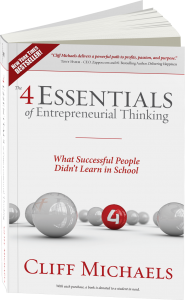 This blog is from a chapter section in…
This blog is from a chapter section in…The 4 Essentials of Entrepreneurial Thinking
Essential 3, Value 7 – Humor
July 12, 2012
8 Pillars of Quality Relationships
 I once spoke to a group of 200 college students and asked their definition of “a relationship.” Rapid-fire answers bounced off the walls (friend, family, lover, client, mentor). Some responses included positive words like trusted, romantic, or profitable. Others were negative, such as destructive, codependent, or counterproductive.
I once spoke to a group of 200 college students and asked their definition of “a relationship.” Rapid-fire answers bounced off the walls (friend, family, lover, client, mentor). Some responses included positive words like trusted, romantic, or profitable. Others were negative, such as destructive, codependent, or counterproductive.
Equally insightful were questions like, “Which relationships are most important and how do we prioritize them? How many people can we rely on at 3:00 a.m.? And can they rely on us?”
Clearly, definitions vary. We were all influenced in a unique way by parents and siblings, peers and partners, clients and co-workers, and social or business experiences. Along the way, we learned that quality relationships take time and there are no short cuts. But there is a common thread to quality.
Over 20 years, I conducted surveys that included men and women (ages 16 to 95) in over 40 countries and 100 professions. The primary question on personal and professional relationships included: “What’s the Secret to a ‘Quality‘ Long-Term Relationship?” It never ceased to amaze me how similar the response was.
Here are the TOP 8 pillars of highly successful business partners, winning teams, and the happiest couples:
Fun & laughter
Mutual respect
Common values
Trust and loyalty
Selfless listening
Honest communication
Shared passion & purpose
Commitment and consistency
Consider the most important people in your life. Friends? Clients? The barista in a coffee shop perhaps? The partner in your office? The person you’re sharing a pillow with right now?
If your relationship needs a booster shot, double the dose of your 8 pillars. This is one magic elixir where excess is a good thing.
This blog is from a chapter section in…
The 4 Essentials of Entrepreneurial Thinking
Essential 2, Strategy 3 – Relationships & Networking
The 4 Essentials of Entrepreneurial Thinking

In his New York Times Bestseller, Cliff Michaels dispels the myth of born entrepreneurs and proposes a paradigm shift in global education. Taking readers on an inspiring personal journey, Michaels shares his foibles, triumphs, and tribulations as a young entrepreneur, then unleashes a dynamic system of timeless lessons
anyone can follow.
On the cutting edge of success training for over 20 years, Michaels draws on classic and modern mentors from da Vinci, Edison, Mozart, and Einstein to Jobs, Oprah, Branson, Spielberg, and more. Street-smart & thought provoking, The 4 Essentials isn’t just for entrepreneurs. It challenges all of us to earn a real-world MBA – your Master’s in Basic Abilities.
Buy Now




